历年全国大学生英语辩论赛辩题
英语辩论赛辩题大全_辩论赛_
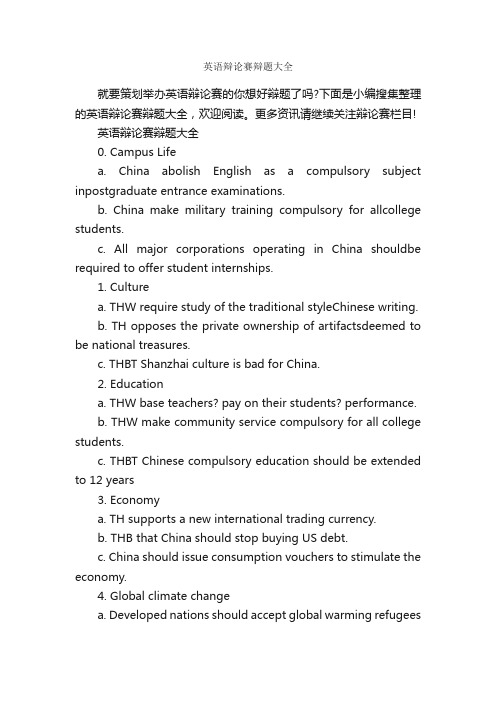
英语辩论赛辩题大全就要策划举办英语辩论赛的你想好辩题了吗?下面是小编搜集整理的英语辩论赛辩题大全,欢迎阅读。
更多资讯请继续关注辩论赛栏目!英语辩论赛辩题大全0. Campus Lifea. China abolish English as a compulsory subject inpostgraduate entrance examinations.b. China make military training compulsory for allcollege students.c. All major corporations operating in China shouldbe required to offer student internships.1. Culturea. THW require study of the traditional styleChinese writing.b. TH opposes the private ownership of artifactsdeemed to be national treasures.c. THBT Shanzhai culture is bad for China.2. Educationa. THW base teachers? pay on their students? performance.b. THW make community service compulsory for all college students.c. THBT Chinese compulsory education should be extended to 12 years3. Economya. TH supports a new international trading currency.b. THB that China should stop buying US debt.c. China should issue consumption vouchers to stimulate the economy.4. Global climate changea. Developed nations should accept global warming refugeesb. Those affected by global climate change should have the right to sue major carbon-emitting nations.c. China should cap its carbon emissions.5. East Asiaa. Immediate elections are in Thailand抯 best interest.b. ASEAN should expel Myanmarc. Direct negotiations between the US and North Korea are preferable to the Six-Party Talks.6. Family & Populationa. THBT women should be allowed to sell their eggsb. TH would require the father抯 consent for abortions.c. China should legalize marriage between homosexuals.7. Crime & Punishmenta. Criminals sentenced to life imprisonment without parole should be allowed to choose deathinstead.b. China should establish a national DNA database of all citizens for the purposes of criminalinvestigations.c. This house would make parents liable for their children抯crimes.8. Governing & Governmenta. THW make one-year military service a qualification for public servants.b. TH would require government officials to make full financial disclosure to the public.c. THW make all NPC representatives full-time, professional legislators.Octofinals: Medical servicea. China should ban hymen reconstruction surgeries.b. China should legalize physician-assisted suicide.c. The World Health Organization (WHO) should have theauthority to quarantine in times ofhealth crises.Quarterfinals: Judiciarya. China should apply capital punishment only to homicide cases.b. China should fully establish a jury-by-peers system.c. Judges should be elected.Semifinals: International IssuesSEMIFINAL #1a. The Shanghai Cooperation Organization should admit Iran as a full member.b. The United Nations should take control of Jerusalem.c. NATO should fully withdraw from Afghanistan before 2019.SEMIFINAL #2a. The USA should stop promoting democracy as part of their foreign policy.b. Pre-emptive strikes on Somalia to curb piracy are justified.c. This house supports Spain抯criminal prosecution of members of the Bushadministration.FinalsThe PRC should ban the production, sale and consumption of all tobacco products.英语辩论赛常用语A征求他人观点或意见的用语I would be glad to hear your opinion of … 我很乐意听听你对……的意见。
英语辩论相关作文题目大全
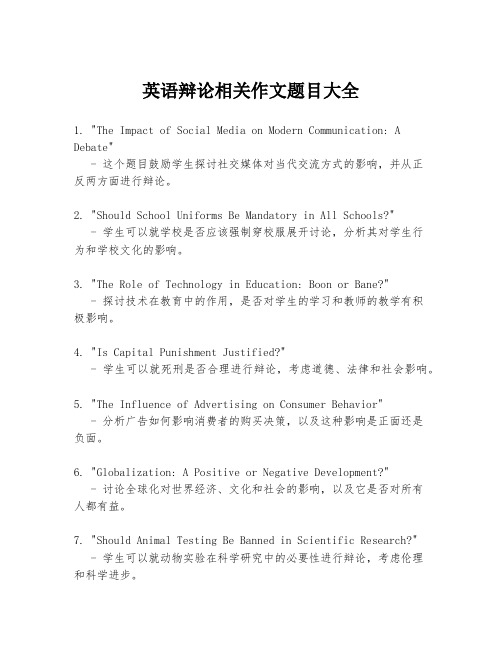
英语辩论相关作文题目大全1. "The Impact of Social Media on Modern Communication: A Debate"- 这个题目鼓励学生探讨社交媒体对当代交流方式的影响,并从正反两方面进行辩论。
2. "Should School Uniforms Be Mandatory in All Schools?"- 学生可以就学校是否应该强制穿校服展开讨论,分析其对学生行为和学校文化的影响。
3. "The Role of Technology in Education: Boon or Bane?"- 探讨技术在教育中的作用,是否对学生的学习和教师的教学有积极影响。
4. "Is Capital Punishment Justified?"- 学生可以就死刑是否合理进行辩论,考虑道德、法律和社会影响。
5. "The Influence of Advertising on Consumer Behavior"- 分析广告如何影响消费者的购买决策,以及这种影响是正面还是负面。
6. "Globalization: A Positive or Negative Development?"- 讨论全球化对世界经济、文化和社会的影响,以及它是否对所有人都有益。
7. "Should Animal Testing Be Banned in Scientific Research?"- 学生可以就动物实验在科学研究中的必要性进行辩论,考虑伦理和科学进步。
8. "The Importance of Learning a Second Language"- 探讨学习第二语言的好处,包括个人发展、职业机会和跨文化交流。
9. "Online Education vs. Traditional Classroom Learning: Which Is More Effective?"- 比较在线教育和传统课堂教学的优劣,分析哪种方式更适合现代学习。
英语辩论赛辩题和答案(3篇)
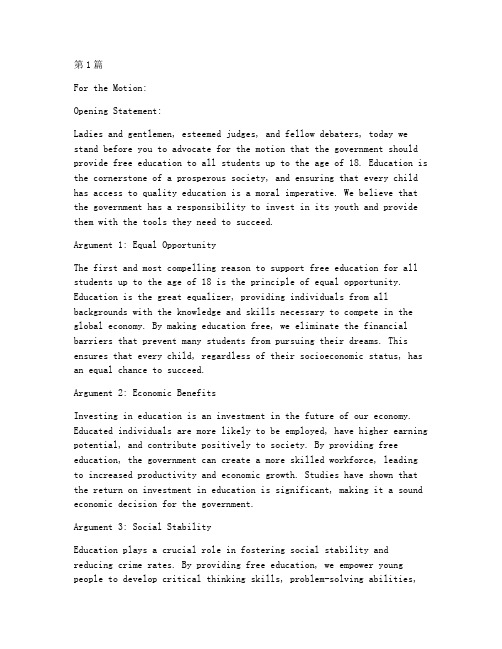
第1篇For the Motion:Opening Statement:Ladies and gentlemen, esteemed judges, and fellow debaters, today we stand before you to advocate for the motion that the government should provide free education to all students up to the age of 18. Education is the cornerstone of a prosperous society, and ensuring that every child has access to quality education is a moral imperative. We believe that the government has a responsibility to invest in its youth and provide them with the tools they need to succeed.Argument 1: Equal OpportunityThe first and most compelling reason to support free education for all students up to the age of 18 is the principle of equal opportunity. Education is the great equalizer, providing individuals from all backgrounds with the knowledge and skills necessary to compete in the global economy. By making education free, we eliminate the financial barriers that prevent many students from pursuing their dreams. This ensures that every child, regardless of their socioeconomic status, has an equal chance to succeed.Argument 2: Economic BenefitsInvesting in education is an investment in the future of our economy. Educated individuals are more likely to be employed, have higher earning potential, and contribute positively to society. By providing free education, the government can create a more skilled workforce, leading to increased productivity and economic growth. Studies have shown that the return on investment in education is significant, making it a sound economic decision for the government.Argument 3: Social StabilityEducation plays a crucial role in fostering social stability and reducing crime rates. By providing free education, we empower young people to develop critical thinking skills, problem-solving abilities,and a sense of civic responsibility. Educated individuals are lesslikely to engage in criminal activities and more likely to be active, productive members of society. This investment in education can lead to a safer, more harmonious community.Argument 4: Moral ResponsibilityLastly, the government has a moral responsibility to ensure that all children have access to education. Education is a fundamental human right, and denying access to it based on financial constraints is a violation of that right. By providing free education, the government demonstrates its commitment to social justice and equity, ensuring that no child is left behind.Rebuttal:While the opposition may argue that free education is unaffordable or that it would lead to a decline in educational quality, these concerns can be addressed. First, the cost of providing free education can be offset by the economic benefits it generates. Second, ensuring quality education is not solely dependent on fees; it requires a comprehensive approach that includes well-trained teachers, modern facilities, and effective educational policies.Closing Statement:In conclusion, providing free education to all students up to the age of 18 is a necessary and beneficial policy. It ensures equal opportunity, fosters economic growth, promotes social stability, and fulfills the government's moral responsibility. We ask you to vote in favor of the motion and support the future of our children and our society.---Against the Motion:Opening Statement:Thank you, esteemed judges, and fellow debaters. We are here to argue against the motion that the government should provide free education toall students up to the age of 18. While the idea of free education may seem noble, it is impractical and fraught with consequences that could undermine the quality of education and the financial stability of the government.Argument 1: Financial BurdenThe primary concern with the motion is the financial burden it places on the government. Education is expensive, and providing free education to millions of students would require a significant allocation of resources. This could lead to cuts in other essential services, such as healthcare, infrastructure, and social welfare. The government must prioritize its spending to ensure that it can meet the needs of its citizens effectively.Argument 2: Quality of EducationAnother critical issue is the potential impact on the quality of education. When the government provides free education, it may be tempted to increase the number of students to maximize its investment. This could lead to overcrowded classrooms, understaffed schools, and a decline in the overall quality of education. It is essential to maintain high standards to ensure that students receive a valuable education that prepares them for future challenges.Argument 3: Incentive for Personal ResponsibilityEducation should be seen as a personal responsibility, and charging fees can serve as an incentive for students to value their education. When students are financially invested in their education, they are morelikely to take it seriously and perform better. Removing this financial barrier may lead to a decrease in student motivation and a rise in dropout rates.Argument 4: Alternative SolutionsInstead of providing free education, the government can explore alternative solutions that address the issue of accessibility. Thiscould include targeted scholarships, student loans with favorable terms,or partnerships with private institutions. These approaches can ensure that students from low-income families receive the support they need without burdening the government's budget.Rebuttal:The proponents may claim that the economic benefits of education justify the financial investment, but this overlooks the long-term costs of maintaining a high-quality education system. Moreover, the governmenthas a duty to manage its resources responsibly, and free education could lead to unsustainable spending practices.Closing Statement:In conclusion, while the desire to provide free education is commendable, it is not a viable solution. The financial burden, potential decline in educational quality, lack of personal responsibility, and alternative solutions make it clear that the government should not adopt this policy. We ask you to reject the motion and consider the long-term implications of such a decision.---This debate provides a framework for discussing the complexities of providing free education to all students up to the age of 18. Both sides present compelling arguments, and the final decision would depend on the priorities and values of the society in question.第2篇Side A: In Favor of Standardized TestingArgument 1: Ensuring Academic Standards- Standardized tests provide a common benchmark for evaluating student performance across different schools and regions. This ensures that all students are held to the same high academic standards, regardless oftheir background or the resources available to their schools.- By requiring a standardized test before graduation, schools can ensure that students have achieved a minimum level of proficiency in coresubjects, which is essential for their future success in higher education and the workforce.Argument 2: Identifying Areas for Improvement- Standardized tests often reveal specific areas where students are struggling. This information can be used by teachers and administrators to tailor their instruction and interventions to address these weaknesses, thereby improving overall student performance.- The data from standardized tests can also help identify trends and patterns that may indicate broader educational issues, such as a lack of access to quality resources or a need for additional support services.Argument 3: Promoting Accountability- Requiring a standardized test before graduation holds schools accountable for their educational outcomes. It incentivizes schools to focus on student achievement and to provide the necessary support forall students to succeed.- Accountability can also extend to teachers, who may be more motivated to deliver effective instruction if they know their performance will be evaluated based on student test scores.Answer to Counterarguments:Counterargument 1: Standardized Tests Do Not Measure True Learning- While it is true that standardized tests may not capture the full breadth of a student's knowledge and skills, they do measure certain critical aspects of learning, such as basic comprehension and problem-solving abilities. These are essential skills that students need to succeed in the real world.- Additionally, schools can use a variety of assessment methods to complement standardized tests, providing a more comprehensive picture of student learning.Counterargument 2: Standardized Tests Create Stress and Pressure- It is important to recognize that standardized tests can indeed create stress and pressure for students. However, this can be mitigated by implementing appropriate test preparation strategies and by creating a supportive testing environment.- Moreover, the benefits of ensuring academic standards and promoting accountability outweigh the potential negative effects of test stress.Counterargument 3: Standardized Tests Can Be Subjective and Biased- It is true that standardized tests can be influenced by factors such as socioeconomic status and cultural background. However, efforts are continually being made to improve the fairness and objectivity of these tests.- Additionally, schools can use the results to identify and address disparities, rather than using them as the sole measure of student performance.Side B: Against Standardized TestingArgument 1: Restricting Personalized Learning- Standardized tests can limit the flexibility of teachers to tailor their instruction to the individual needs of their students. This can result in a one-size-fits-all approach that does not cater to the diverse learning styles and abilities of students.- By focusing on test preparation, schools may prioritize rote learning and memorization over critical thinking and creativity, which are essential skills for the 21st century.Argument 2: Overemphasizing Test Scores- An overemphasis on standardized test scores can lead to a narrow focus on academic performance at the expense of other important educational outcomes, such as social-emotional development, physical health, and the arts.- This narrow focus can also create a competitive and stressful environment for students, which may have long-term negative effects on their well-being.Argument 3: Disproportionate Impact on Marginalized Students- Standardized tests can disproportionately impact marginalized students, who may face additional challenges such as language barriers, lack of access to resources, or discrimination.- The pressure to perform well on these tests can exacerbate existing inequalities and hinder the educational opportunities of these students.Answer to Counterarguments:Counterargument 1: Standardized Tests Provide a Consistent Measure of Student Performance- While standardized tests do provide a consistent measure of student performance, they should not be the sole measure. Schools should use a variety of assessment methods to ensure a well-rounded evaluation of student learning.- Moreover, standardized tests can be used as one tool among many to inform instruction and support students, rather than as the primary focus.Counterargument 2: Test Scores Do Not Reflect the Entire Educational Experience- It is true that test scores do not reflect the entire educational experience, but they do provide valuable information about certain aspects of student learning. This information can be used to identify strengths and weaknesses and to inform educational strategies.- The goal should be to use standardized test results as part of a larger, more holistic approach to student assessment.Counterargument 3: Efforts Can Be Made to Mitigate the Disproportionate Impact- While it is important to acknowledge the disproportionate impact of standardized tests on marginalized students, efforts can be made to mitigate this impact. This includes providing additional support and resources to these students, as well as using alternative assessment methods that are more equitable.In conclusion, while standardized testing has its drawbacks, thebenefits of ensuring academic standards, identifying areas for improvement, and promoting accountability make it a necessary component of the educational system. By using standardized tests as one tool among many and addressing the concerns of fairness and equity, schools can create a more balanced and effective approach to student assessment and support.第3篇Should governments around the world prioritize the development of renewable energy sources over the expansion of fossil fuel infrastructure?Answer for the Proposition (Pro):Introduction:The proposition argues that governments worldwide should prioritize the development of renewable energy sources over the expansion of fossilfuel infrastructure. This stance is supported by the urgent need to combat climate change, enhance energy security, and foster sustainable economic growth.Argument 1: Climate Change MitigationThe primary reason for prioritizing renewable energy is the urgent need to mitigate climate change. Fossil fuels are the largest contributors to greenhouse gas emissions, which are causing global temperatures to rise, leading to extreme weather events, rising sea levels, and the loss of biodiversity. By investing in renewable energy, governments can significantly reduce carbon emissions and slow down the pace of climate change.Answer 1.1: Renewable Energy's Emissions ProfileRenewable energy sources, such as solar, wind, hydro, and geothermal, produce little to no greenhouse gas emissions during operation. In contrast, fossil fuels release substantial amounts of carbon dioxide and other pollutants when burned. Prioritizing renewable energy will lead to a cleaner energy mix and a healthier planet.Answer 1.2: Technological AdvancementsAdvancements in renewable energy technology have made it more efficient and cost-effective. Solar panels are becoming cheaper and more efficient, wind turbines are producing more power at lower wind speeds, and battery storage is becoming more reliable. These advancements make renewable energy a viable alternative to fossil fuels.Argument 2: Energy SecurityAnother compelling reason to prioritize renewable energy is the enhancement of energy security. Countries that rely heavily on fossil fuels are vulnerable to price volatility and geopolitical tensions. By diversifying their energy sources and investing in renewable energy, governments can reduce their dependence on fossil fuels and stabilize energy prices.Answer 2.1: Diversification of Energy SourcesRenewable energy sources are typically abundant and widely distributed. Unlike fossil fuels, which are concentrated in certain regions, renewable energy can be harnessed almost anywhere in the world. This diversification reduces the risk of energy supply disruptions and enhances energy security.Answer 2.2: Economic ResilienceInvesting in renewable energy can create jobs and stimulate economic growth. The renewable energy sector is one of the fastest-growing job markets globally. By prioritizing renewable energy, governments can create new employment opportunities and build a more resilient economy.Argument 3: Long-term Economic BenefitsRenewable energy offers long-term economic benefits that outweigh the short-term costs of transitioning away from fossil fuels. While the initial investment in renewable energy infrastructure can be high, the long-term savings in energy costs and health care expenditures are significant.Answer 3.1: Lower Energy CostsRenewable energy is often more cost-effective in the long run. As technology improves and economies of scale are achieved, the cost of renewable energy will continue to decline. This will lead to lower energy bills for consumers and businesses.Answer 3.2: Health Care SavingsThe pollution associated with fossil fuels contributes to respiratory diseases, heart conditions, and other health issues. By reducing air pollution through the adoption of renewable energy, governments can save money on health care costs and improve public health.Conclusion:In conclusion, the proposition strongly supports the idea that governments worldwide should prioritize the development of renewable energy sources over the expansion of fossil fuel infrastructure. The need to mitigate climate change, enhance energy security, and foster sustainable economic growth makes renewable energy a compelling and necessary choice. By investing in renewable energy, governments can create a cleaner, more secure, and prosperous future for their citizens.Answer for the Opposing Proposition (Con):Introduction:The opposing proposition argues that governments worldwide should not prioritize the development of renewable energy sources over the expansion of fossil fuel infrastructure. This stance is based on thebelief that fossil fuels are currently more reliable, affordable, and essential for meeting the world's energy demands.Argument 1: Reliability and AffordabilityFossil fuels are currently the most reliable and affordable energy sources available. They provide a consistent and predictable energy supply, which is crucial for economic stability and growth. Prioritizing renewable energy could lead to energy shortages and increased costs.Answer 1.1: Reliability of Fossil FuelsFossil fuel infrastructure is well-established and has been providing energy for centuries. This reliability is essential for industries, transportation, and other sectors that require a stable energy supply. Renewable energy sources, on the other hand, are intermittent and depend on weather conditions, which can lead to power outages and energy shortages.Answer 1.2: Affordability of Fossil FuelsFossil fuels are currently the cheapest form of energy available. This affordability makes them accessible to a wide range of consumers and businesses. Shifting to renewable energy could lead to higher energy costs, which could disproportionately affect low-income households and small businesses.Argument 2: Energy SecurityExpanding fossil fuel infrastructure can enhance energy security by reducing dependence on imported fuels and increasing domestic energy production. This is particularly important for countries that rely on energy imports, as it reduces their vulnerability to geopolitical tensions and price fluctuations.Answer 2.1: Geopolitical TensionsCountries that rely on fossil fuel imports are at the mercy of globaloil markets and geopolitical events. By developing domestic fossil fuelresources, governments can gain more control over their energy supply and reduce their exposure to these risks.Answer 2.2: Domestic Energy ProductionExpanding fossil fuel infrastructure can create jobs and stimulate economic growth in the energy sector. This domestic production can also provide a source of revenue for governments and contribute to national economic stability.Argument 3: Technological and Economic ChallengesThe transition to renewable energy faces significant technological and economic challenges. The intermittent nature of renewable energy requires substantial investment in energy storage and grid infrastructure. Additionally, the renewable energy sector is not yet as mature as the fossil fuel industry, which has decades of experience and a well-developed supply chain.Answer 3.1: Energy StorageRenewable energy sources, such as wind and solar, are intermittent and depend on weather conditions. Energy storage solutions, such as batteries, are necessary to ensure a stable energy supply. However, the current technology is still expensive and not yet fully scalable.Answer 3.2: Supply Chain and InfrastructureThe renewable energy sector lacks the well-established supply chain and infrastructure of the fossil fuel industry. This can lead to inefficiencies and higher costs, which may hinder the transition to renewable energy.Conclusion:In conclusion, the opposing proposition believes that governments worldwide should not prioritize the development of renewable energy sources over the expansion of fossil fuel infrastructure. Fossil fuels are currently the most reliable and affordable energy sources, and expanding fossil fuel infrastructure can enhance energy security andeconomic stability. While the transition to renewable energy is important, it must be done in a manner that ensures reliability, affordability, and energy security.。
英语辩论赛常见辩题简单(3篇)
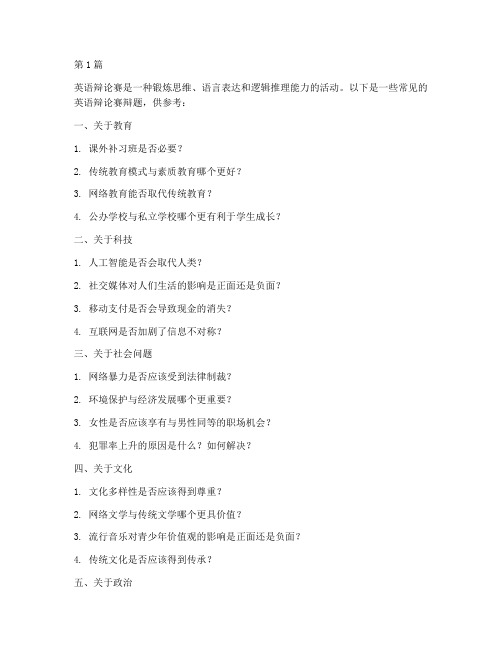
第1篇英语辩论赛是一种锻炼思维、语言表达和逻辑推理能力的活动。
以下是一些常见的英语辩论赛辩题,供参考:一、关于教育1. 课外补习班是否必要?2. 传统教育模式与素质教育哪个更好?3. 网络教育能否取代传统教育?4. 公办学校与私立学校哪个更有利于学生成长?二、关于科技1. 人工智能是否会取代人类?2. 社交媒体对人们生活的影响是正面还是负面?3. 移动支付是否会导致现金的消失?4. 互联网是否加剧了信息不对称?三、关于社会问题1. 网络暴力是否应该受到法律制裁?2. 环境保护与经济发展哪个更重要?3. 女性是否应该享有与男性同等的职场机会?4. 犯罪率上升的原因是什么?如何解决?四、关于文化1. 文化多样性是否应该得到尊重?2. 网络文学与传统文学哪个更具价值?3. 流行音乐对青少年价值观的影响是正面还是负面?4. 传统文化是否应该得到传承?五、关于政治1. 一国两制是否适用于香港、澳门?2. 民主制度与专制制度哪个更优越?3. 贸易战对全球经济的影响是正面还是负面?4. 国家是否应该干预互联网言论?六、关于个人成长1. 个人的成功是先天决定还是后天努力?2. 父母对孩子的教育方式是否应该一视同仁?3. 青少年是否应该接受心理辅导?4. 个人的兴趣爱好是否应该受到社会压力的影响?七、关于健康1. 饮食健康与生活习惯哪个更重要?2. 互联网成瘾是否应该被列为心理疾病?3. 健康生活方式是否应该从小培养?4. 国家是否应该加大投入,提高国民健康水平?八、关于历史1. 历史是否应该被铭记?2. 历史人物的评价是否应该客观?3. 历史事件对现代社会的启示是什么?4. 历史教育是否应该得到重视?这些辩题涵盖了教育、科技、社会、文化、政治、个人成长、健康和历史等多个领域,既具有普遍性,又具有一定的争议性。
在英语辩论赛中,辩手们可以通过对这些辩题的探讨,提高自己的思维能力和语言表达能力。
第2篇一、引言英语辩论赛是一种考验参赛者思维敏捷、语言表达、逻辑推理等能力的竞赛活动。
英文辩论赛辩题大全
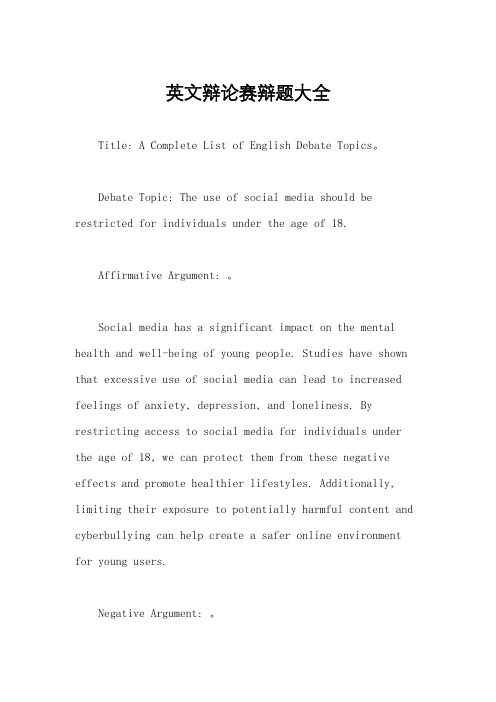
英文辩论赛辩题大全Title: A Complete List of English Debate Topics。
Debate Topic: The use of social media should be restricted for individuals under the age of 18.Affirmative Argument: 。
Social media has a significant impact on the mental health and well-being of young people. Studies have shown that excessive use of social media can lead to increased feelings of anxiety, depression, and loneliness. By restricting access to social media for individuals under the age of 18, we can protect them from these negative effects and promote healthier lifestyles. Additionally, limiting their exposure to potentially harmful content and cyberbullying can help create a safer online environment for young users.Negative Argument: 。
Restricting access to social media for individuals under the age of 18 would infringe upon their freedom of speech and expression. Furthermore, social media can also provide opportunities for young people to connect with others, express themselves, and access valuable educational resources. Instead of imposing restrictions, we should focus on educating young users about responsible and safe use of social media, as well as implementing better regulations and safeguards to protect them from harmful content and cyberbullying.In conclusion, the debate over whether to restrict the use of social media for individuals under the age of 18 is a complex and multifaceted issue. Both sides present valid arguments, and it is important to consider the potential benefits and drawbacks of such restrictions. Ultimately, the decision should be based on a thorough examination of the evidence and a consideration of the best interests of young people.。
英语辩论题目 (3)
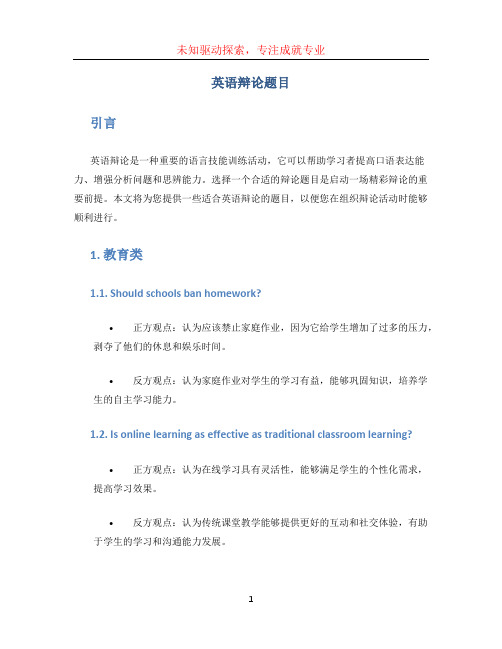
英语辩论题目引言英语辩论是一种重要的语言技能训练活动,它可以帮助学习者提高口语表达能力、增强分析问题和思辨能力。
选择一个合适的辩论题目是启动一场精彩辩论的重要前提。
本文将为您提供一些适合英语辩论的题目,以便您在组织辩论活动时能够顺利进行。
1. 教育类1.1. Should schools ban homework?•正方观点:认为应该禁止家庭作业,因为它给学生增加了过多的压力,剥夺了他们的休息和娱乐时间。
•反方观点:认为家庭作业对学生的学习有益,能够巩固知识,培养学生的自主学习能力。
1.2. Is online learning as effective as traditional classroom learning?•正方观点:认为在线学习具有灵活性,能够满足学生的个性化需求,提高学习效果。
•反方观点:认为传统课堂教学能够提供更好的互动和社交体验,有助于学生的学习和沟通能力发展。
2. 科技类2.1. Should robots replace human workers?•正方观点:认为机器人可以完成重复、危险和繁琐的工作,提高工作效率,减少人力成本。
•反方观点:认为机器人的智能无法替代人类的创造力、决策能力和人情味。
2.2. Is social media a positive influence on society?•正方观点:认为社交媒体有助于信息传播、社交互动和个人表达,促进社会发展和人际关系建立。
•反方观点:认为社交媒体容易导致信息泛滥、隐私泄露和社交隔离,对社会造成负面影响。
3. 社会类3.1. Should the voting age be lowered to 16?•正方观点:认为16岁的年轻人具有一定的思考能力和社会责任感,应该有权利参与选举。
•反方观点:认为16岁的年轻人缺乏足够的生活经验和政治意识,不适合参与选举。
3.2. Is animal testing necessary for scientific research?•正方观点:认为动物实验能够为科学研究提供重要的数据和结论,推动医学和科技的发展。
常见英语辩论赛辩题(3篇)
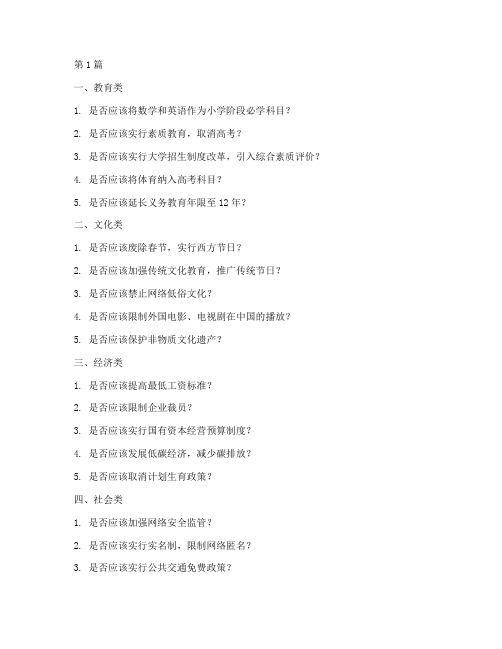
第1篇一、教育类1. 是否应该将数学和英语作为小学阶段必学科目?2. 是否应该实行素质教育,取消高考?3. 是否应该实行大学招生制度改革,引入综合素质评价?4. 是否应该将体育纳入高考科目?5. 是否应该延长义务教育年限至12年?二、文化类1. 是否应该废除春节,实行西方节日?2. 是否应该加强传统文化教育,推广传统节日?3. 是否应该禁止网络低俗文化?4. 是否应该限制外国电影、电视剧在中国的播放?5. 是否应该保护非物质文化遗产?三、经济类1. 是否应该提高最低工资标准?2. 是否应该限制企业裁员?3. 是否应该实行国有资本经营预算制度?4. 是否应该发展低碳经济,减少碳排放?5. 是否应该取消计划生育政策?四、社会类1. 是否应该加强网络安全监管?2. 是否应该实行实名制,限制网络匿名?3. 是否应该实行公共交通免费政策?4. 是否应该取消城市限行政策?5. 是否应该实行垃圾分类制度?五、国际关系类1. 是否应该加入世界贸易组织(WTO)?2. 是否应该支持自由贸易?3. 是否应该加强国际合作,共同应对全球气候变化?4. 是否应该支持发展中国家的发展?5. 是否应该加强国际反恐合作?六、科技类1. 是否应该禁止人工智能在军事领域的应用?2. 是否应该限制基因编辑技术?3. 是否应该加强网络安全,防止网络攻击?4. 是否应该鼓励发展可再生能源?5. 是否应该限制电子烟的生产和销售?七、政治类1. 是否应该实行多党制?2. 是否应该加强民主监督,防止腐败?3. 是否应该废除死刑?4. 是否应该实行财产公示制度?5. 是否应该限制政府权力,保障公民权利?八、环保类1. 是否应该实行垃圾分类制度?2. 是否应该限制塑料制品的使用?3. 是否应该加强环保宣传教育,提高公民环保意识?4. 是否应该限制化石燃料的使用,发展清洁能源?5. 是否应该加强国际合作,共同应对全球气候变化?九、医疗类1. 是否应该实行全民免费医疗?2. 是否应该加强医德医风建设,提高医疗服务质量?3. 是否应该加强公共卫生体系建设,提高应对突发公共卫生事件的能力?4. 是否应该限制医疗广告,保护患者权益?5. 是否应该鼓励发展中医药,传承中医药文化?这些常见英语辩论赛辩题涵盖了教育、文化、经济、社会、国际关系、科技、政治、环保和医疗等多个领域,为参赛者提供了丰富的素材和思考方向。
大学英语口语考试辩论话题内容

大学英语口语考试辩论话题内容14: Arguments for or against a ban on genetic engineering A:forB:againstA: Our world has entered into a new biological and social existence that is shaped by computers, mass media, and biotechnology.for example , Genetic engineering help people solve many things ,in’t it?B:well,but humans should not be modifying the genetic makeup of other organisms。
We should keep them in nature .A: Genetic engineering reduces costs of production. This means that the poor can afford more food, and be more self sufficient. They're tasty and nutritious Some are easy to raise specifically for food, or are easy to catch.it’s pecfctB:Human beings are themselves part of nature, creatures within creation. Human discovery and invention can be thought of as resulting from the exercise of God-given powers of mind and reason.A: though it ,we can Design what people want or need , Improve or add desirable characteristics,even Remove undesirable cha racteristics.it‘s the big deal .B:ok,I like things those are natural ,but Genetic Engineering is unnatural,I can with you . 15:Arguments for or against the view that women face unequal treatment in getting promoted:AagainstB:forA; In a modern society, one would think that sexual discrimination had long disappeared.But My mom didn't get the position she wanted again, theypromoted some new guy to the job. I think it’s not fair for women.B: However, this is not the case. Although women are given more chances than they had before. if a couple was divorce women can get 70% of her man's money! IN UK,SOi think every country's Culture are diffenent.OR other reasons.A;wow,no . do you know that western women did not have the same rights like Muslim women ,for example: Muslim women have right to keep her family name after marriage.Muslim women have right to have independent budget with out inquiring of her husband.B: so this is why some country man are king but some country women are king. becuase their culture are different.A:but in country especially in a traditional country like China Some women are still expected to stay at home when they married.why man?B: well,they are equal but they don't have the same rights as men just as men don't have the same rights as women. each of them has a role and the rights are given accordingly.16: Arguments for or against divorce as the solution to a loveless marriageSupporter for divorce=A: if marriage has no love ,marriage just is an afflict[ ?'flikt ]折磨for the person need love.so I think divorce is a better solution to a loveless marriage.Against divorce =B:Divorce do many harms to a family. whats more, The loveless marriage will free people from some obligation[ ??bli'gei∫n ]义务.so I think divorce is the worst r solution to a loveless marriage.A:if marriage has no love ,marriage just is an afflict[ ?'flikt ]折磨for the person need love. There is no care for each other andcomfortable communication to make life significant. whats more, the neglect between them buries bomb which will break out somedayB: divorce is not a reasonable solution. Everything has two sides. The loveless marriage will free people from some obligation[ ??bli'gei∫n ]义务.Besides ,the less you pay, the less emotional demands you have, which reduce disputeA: we marry not for the lifeless life. This also has harm to mental health of the coming generation.B: if one has no economic capability, divorce will destroy his life, so do their children and their old parents. Divorce hurt more people.A: the essential issue is loveless marriage having no happiness. Why not look for confident and wonderful life elsewhere?B: this is just personal interests, how can we don’t assume the responsibility for the marriage? Divorce will lead to more social problem.A;well,I still think the emotion is more important.but I accept you too.。
英语辩论赛辩题及答案(3篇)
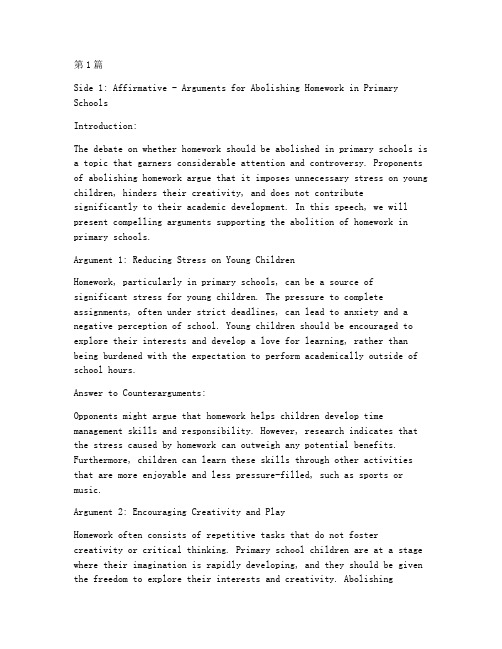
第1篇Side 1: Affirmative - Arguments for Abolishing Homework in Primary SchoolsIntroduction:The debate on whether homework should be abolished in primary schools is a topic that garners considerable attention and controversy. Proponents of abolishing homework argue that it imposes unnecessary stress on young children, hinders their creativity, and does not contributesignificantly to their academic development. In this speech, we will present compelling arguments supporting the abolition of homework in primary schools.Argument 1: Reducing Stress on Young ChildrenHomework, particularly in primary schools, can be a source ofsignificant stress for young children. The pressure to complete assignments, often under strict deadlines, can lead to anxiety and a negative perception of school. Young children should be encouraged to explore their interests and develop a love for learning, rather than being burdened with the expectation to perform academically outside of school hours.Answer to Counterarguments:Opponents might argue that homework helps children develop time management skills and responsibility. However, research indicates that the stress caused by homework can outweigh any potential benefits. Furthermore, children can learn these skills through other activities that are more enjoyable and less pressure-filled, such as sports or music.Argument 2: Encouraging Creativity and PlayHomework often consists of repetitive tasks that do not fostercreativity or critical thinking. Primary school children are at a stage where their imagination is rapidly developing, and they should be given the freedom to explore their interests and creativity. Abolishinghomework would allow children to spend more time engaging in play, which is a crucial part of their cognitive and emotional development.Answer to Counterarguments:It is true that some homework assignments are designed to encourage critical thinking. However, the majority of primary school homework is focused on rote learning, which does not promote creativity. Moreover, children can develop critical thinking skills through hands-onactivities and group projects within the classroom, which are more engaging and beneficial.Argument 3: Limited Academic BenefitResearch has shown that the academic benefits of homework in primary schools are minimal. The amount of homework assigned does not correlate with improved academic performance, and some studies suggest that it can even hinder learning. Children in primary school are still developing their cognitive abilities, and the focus should be on foundationalskills rather than extended academic work.Answer to Counterarguments:Advocates of homework may argue that it reinforces what is learned in class. However, this can be achieved through other means, such as classroom discussions, group work, and interactive learning activities. Furthermore, the primary focus of primary education should be on laying the groundwork for future learning, not on the amount of homework completed.Argument 4: Impact on Family LifeHomework can also have a negative impact on family life. Parents often feel pressured to help their children with assignments, which can lead to tension and stress within the household. Additionally, children who are expected to complete homework may have less time to spend with family and friends, which is crucial for their social development.Answer to Counterarguments:It is understandable that some parents may find it difficult to balance work and helping their children with homework. However, this is a separate issue from whether homework should be abolished. Providing support and resources to parents can help alleviate this burden, but it does not negate the need to reconsider the role of homework in primary education.Conclusion:In conclusion, the arguments for abolishing homework in primary schools are compelling. The stress it imposes on young children, its limited academic benefits, and its potential to hinder creativity and familylife all point towards the need for a reevaluation of the role of homework in primary education. By removing the burden of homework, we can create a more supportive and enjoyable learning environment for primary school children, fostering their love for learning and their overall well-being.Side 2: Negative - Arguments Against Abolishing Homework in Primary SchoolsIntroduction:While the affirmative side has presented strong arguments for the abolition of homework in primary schools, it is important to consider the opposing viewpoint. The negative side believes that homework plays a crucial role in a child's education and development. In this speech, we will present arguments against abolishing homework in primary schools.Argument 1: Reinforcement of LearningHomework serves as a reinforcement of what is learned in the classroom. It allows children to practice and reinforce their understanding of the subject matter, ensuring that they retain information and are better prepared for future lessons. Without homework, children may forget what they have learned, leading to gaps in their knowledge.Answer to Counterarguments:Proponents of abolishing homework might argue that children canreinforce their learning through other means, such as classroom discussions and group projects. However, these methods do not providethe same level of individualized attention and repetition that homework does. Homework allows children to work at their own pace and revisit concepts that they may not fully understand.Argument 2: Development of Responsibility and Time Management SkillsHomework is an essential tool for teaching children responsibility and time management skills. By assigning homework, teachers are preparing children for the demands of higher education and the workforce. These skills are crucial for success in later life and should be developed at an early age.Answer to Counterarguments:It is true that homework can help children develop these skills. However, the amount of homework assigned should be appropriate for the age and developmental level of the children. Excessive homework can actually hinder the development of these skills by creating an environment of stress and burnout.Argument 3: Parental InvolvementHomework provides an opportunity for parents to be involved in theirchild's education. By helping with homework, parents can stay informed about their child's progress and reinforce learning at home. This involvement can strengthen the parent-child relationship and promote a shared sense of accomplishment.Answer to Counterarguments:While parental involvement is important, it should not be forced through homework. Parents should be encouraged to support their child's learning in a way that is enjoyable and meaningful, not through completing additional assignments. Quality time spent on educational activities, rather than traditional homework, can be more beneficial.Argument 4: Academic PerformanceResearch has shown that homework can lead to improved academic performance. By completing assignments, children are able to apply what they have learned in class to real-world scenarios, which can enhance their understanding and retention of the material. Without homework, some children may fall behind in their academic development.Answer to Counterarguments:It is true that homework can have a positive impact on academic performance. However, the quality and type of homework assigned are crucial. Homework should be purposeful and engaging, rather than a chore. Additionally, the benefits of homework should be weighed against the potential negative impacts on children's mental health and well-being.Conclusion:In conclusion, the negative side believes that homework plays a vitalrole in a child's education and development. While it is important to consider the potential drawbacks of homework, it is also essential to recognize its benefits. By assigning appropriate and purposeful homework, teachers can help children reinforce their learning, develop important skills, and achieve academic success. The key is to strike a balance between the educational benefits of homework and the well-being of the students.第2篇Should governments around the world implement a global minimum wage to ensure fair labor standards?Answer for the Proposition (For the Implementation of a Global Minimum Wage):Introduction:The implementation of a global minimum wage is a crucial step towards ensuring fair labor standards worldwide. This motion argues that a uniform minimum wage would protect workers from exploitation, reduce poverty, and stimulate economic growth. By examining the benefits ofsuch a policy, we can conclude that the implementation of a global minimum wage is not only ethical but also economically sound.Argument 1: Protection against ExploitationThe first and foremost reason to implement a global minimum wage is to protect workers from exploitation. In many countries, particularly in developing regions, workers are often subjected to low wages and harsh working conditions. This not only degrades their quality of life butalso perpetuates a cycle of poverty. A global minimum wage would set a standard that ensures workers receive fair compensation for their labor, thus preventing exploitation.Counter-Argument 1: Economic DifferencesOpponents argue that implementing a global minimum wage would be unfeasible due to the vast economic differences between countries. However, this argument fails to recognize that a global minimum wage could be tiered based on the economic development of each nation. This would allow for flexibility while still providing a basic level of protection for workers in all regions.Argument 2: Reduction of PovertyA global minimum wage would significantly reduce poverty rates worldwide. By ensuring that workers earn a living wage, they would have thefinancial stability necessary to support themselves and their families. This would lead to a decrease in the number of people living in extreme poverty, thereby improving overall social welfare.Counter-Argument 2: Inflation and Cost of LivingCritics contend that a global minimum wage could lead to inflation and increased costs of living. However, this argument overlooks the factthat higher wages would stimulate consumer spending, which in turn would boost economic growth. Additionally, a global minimum wage could be adjusted over time to account for changes in the cost of living and inflation.Argument 3: Economic Growth and ProductivityA global minimum wage can stimulate economic growth and productivity. When workers are paid fairly, they are more likely to be motivated and productive. This increased productivity can lead to higher profits for businesses, which can then be reinvested in the economy. Furthermore, a more prosperous workforce is more likely to contribute to the overall economic development of their country.Counter-Argument 3: Job Losses and Business FailuresOpponents argue that a global minimum wage could lead to job losses and business failures, particularly in small businesses. However, this argument fails to consider the long-term benefits of a well-paid workforce. By reducing turnover and increasing employee loyalty, businesses can enjoy greater stability and success. Additionally, a global minimum wage could be adjusted to account for the varying economic conditions of different businesses.Argument 4: Ethical ConsiderationsFrom an ethical standpoint, implementing a global minimum wage is the right thing to do. Workers deserve fair compensation for their hard work and dedication. By setting a minimum wage standard, governments can ensure that workers are treated with dignity and respect.Counter-Argument 4: Cultural and Social DifferencesSome argue that a global minimum wage would impose Western standards on other cultures, leading to cultural and social conflicts. However, a global minimum wage could be designed to respect cultural and social differences, with room for flexibility and adaptation to local conditions.Conclusion:In conclusion, the implementation of a global minimum wage is a necessary and beneficial policy. It would protect workers from exploitation, reduce poverty, stimulate economic growth, and promote ethical standards. While challenges and concerns exist, these can be addressed through careful planning and consideration of the uniquecircumstances of each country. Therefore, we strongly advocate for the implementation of a global minimum wage to ensure fair labor standards worldwide.第3篇Should governments invest more in renewable energy sources or prioritize the development of fossil fuel infrastructure?Side A: Argument for Investing in Renewable EnergyOpening Statement:Ladies and gentlemen, esteemed judges, and fellow debaters, today we stand before you to argue that governments should invest more in renewable energy sources rather than prioritizing the development of fossil fuel infrastructure. The case for renewable energy is compelling, driven by environmental, economic, and societal benefits that far outweigh the temporary allure of fossil fuels.Argument 1: Environmental BenefitsThe most pressing reason to invest in renewable energy is the urgent need to combat climate change. The Intergovernmental Panel on Climate Change (IPCC) has warned that we must limit global warming to 1.5 degrees Celsius to avoid catastrophic consequences. Renewable energy sources, such as solar, wind, and hydroelectric power, produce little to no greenhouse gas emissions, which are the primary contributors to global warming. By shifting our energy portfolio to renewables, we can significantly reduce our carbon footprint and mitigate the effects of climate change.Argument 2: Economic AdvantagesContrary to the belief that renewable energy is too costly, the economic case is equally compelling. The cost of renewable energy has dropped dramatically in recent years, making it increasingly competitive with fossil fuels. Moreover, investing in renewable energy creates jobs. According to the International Renewable Energy Agency (IRENA), the renewable energy sector employed 11.5 million people worldwide in 2019,and this number is expected to grow as the demand for clean energy increases. Additionally, renewable energy projects often lead to local economic development, as they require materials, labor, and services from within the community.Argument 3: Energy Security and IndependenceReliance on fossil fuels for energy needs leaves countries vulnerable to price fluctuations and geopolitical tensions. By investing in renewable energy, governments can enhance energy security and reduce dependence on imported fuels. Countries like Germany and Denmark have already achieved significant levels of renewable energy generation, demonstrating that it is possible to become energy-independent while maintaining a stable and reliable power supply.Argument 4: Health BenefitsThe health impacts of fossil fuel consumption are undeniable. Air pollution from coal-fired power plants and other fossil fuel infrastructure contributes to respiratory and cardiovascular diseases, as well as premature deaths. By transitioning to renewable energy, we can significantly improve air quality and public health, leading to lower healthcare costs and a better quality of life for citizens.Rebuttal to CounterargumentsOpponents may argue that renewable energy is not always reliable andthat we need to invest in fossil fuel infrastructure to ensure a stable energy supply. However, advancements in energy storage technologies, such as batteries and pumped hydro storage, are making renewable energy more reliable and less susceptible to the whims of weather conditions. Additionally, the intermittent nature of renewable energy can be mitigated through a mix of different renewable sources and the integration of smart grid technologies.Closing Statement:In conclusion, the case for investing more in renewable energy is clear and compelling. The environmental, economic, and societal benefits ofrenewable energy far outweigh the temporary advantages of fossil fuels. By prioritizing renewable energy, governments can ensure a sustainable future for their citizens, protect the planet, and foster economic growth. Thank you.Side B: Argument for Prioritizing Fossil Fuel InfrastructureOpening Statement:Thank you, judges, and fellow debaters. Today, we present the counter-argument that governments should prioritize the development of fossil fuel infrastructure over investment in renewable energy. While theallure of clean energy is undeniable, the practicalities and immediate needs of energy security, economic stability, and technological maturity of fossil fuels make this the wiser choice.Argument 1: Energy Security and ReliabilityFossil fuels, particularly oil and natural gas, provide a reliable and consistent energy supply that is crucial for economic stability and security. Unlike renewables, which are often intermittent and dependent on weather conditions, fossil fuels can be counted on to provide a steady flow of energy. This reliability is essential for industries, transportation, and everyday life, and cannot be overlooked.Argument 2: Economic StabilityThe development of fossil fuel infrastructure has been a significant driver of economic growth and job creation in many countries. Investing in new oil and gas projects can stimulate local economies, create jobs, and generate tax revenue. Moreover, many countries rely on fossil fuel exports as a major source of income, and neglecting this sector could have severe economic consequences.Argument 3: Technological Maturity and InfrastructureThe technology for extracting and utilizing fossil fuels has reached a level of maturity that is not yet matched by many renewable energy sources. Oil and gas extraction, refining, and transportation are well-established industries with a proven track record of safety andefficiency. While renewable energy technologies are rapidly advancing, they are still in the early stages of development and may not be as reliable or efficient as fossil fuel technologies.Argument 4: Transition to Renewable EnergyTransitioning to renewable energy is a complex and lengthy process that requires significant investment and infrastructure development. In the meantime, fossil fuels can provide a bridge to a cleaner energy future. By prioritizing the development of fossil fuel infrastructure, governments can ensure a smooth transition to renewable energy while meeting current energy demands.Rebuttal to CounterargumentsThe argument that renewable energy is not reliable is a red herring. While it is true that renewable energy can be intermittent, advancements in energy storage and grid management are making it increasingly reliable. Moreover, the health and environmental costs associated with fossil fuels are significant and cannot be ignored.Closing Statement:In conclusion, the development of fossil fuel infrastructure isessential for maintaining energy security, economic stability, and technological progress. While the transition to renewable energy is important, it is not a viable option for all countries at this time. By prioritizing fossil fuel infrastructure, governments can ensure that their citizens have access to reliable and affordable energy while working towards a cleaner energy future. Thank you.。
英语辩论赛辩题精选大全
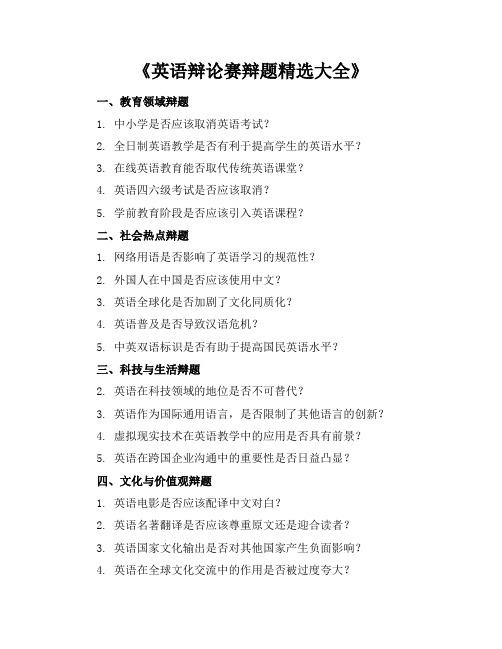
《英语辩论赛辩题精选大全》一、教育领域辩题1. 中小学是否应该取消英语考试?2. 全日制英语教学是否有利于提高学生的英语水平?3. 在线英语教育能否取代传统英语课堂?4. 英语四六级考试是否应该取消?5. 学前教育阶段是否应该引入英语课程?二、社会热点辩题1. 网络用语是否影响了英语学习的规范性?2. 外国人在中国是否应该使用中文?3. 英语全球化是否加剧了文化同质化?4. 英语普及是否导致汉语危机?5. 中英双语标识是否有助于提高国民英语水平?三、科技与生活辩题2. 英语在科技领域的地位是否不可替代?3. 英语作为国际通用语言,是否限制了其他语言的创新?4. 虚拟现实技术在英语教学中的应用是否具有前景?5. 英语在跨国企业沟通中的重要性是否日益凸显?四、文化与价值观辩题1. 英语电影是否应该配译中文对白?2. 英语名著翻译是否应该尊重原文还是迎合读者?3. 英语国家文化输出是否对其他国家产生负面影响?4. 英语在全球文化交流中的作用是否被过度夸大?5. 学习英语是否有助于了解西方文化?五、政策与法规辩题1. 我国是否应该实行英语义务教育?2. 英语能力是否应该成为公务员招聘的必备条件?3. 英语考试改革是否有利于选拔人才?4. 英语课程标准是否需要与时俱进?5. 我国英语教育政策是否需要调整?《英语辩论赛辩题精选大全》六、经济与就业辩题1. 英语能力对企业员工的职业发展影响有多大?2. 英语是否应该成为国际贸易的官方语言?3. 英语水平是否决定了非英语国家求职者的就业机会?4. 在全球经济一体化背景下,英语的重要性是否在增加?5. 英语沟通能力对企业拓展国际市场的作用是否被高估?七、环保与可持续发展辩题1. 英语在环保国际合作中的角色是否不可替代?2. 英语普及是否有助于提高全球环保意识?3. 英语在传播可持续发展理念中的作用是否重要?4. 英语媒体在环保议题上的报道是否具有偏见?5. 英语能力是否影响了发展中国家参与国际环保事务?八、健康与医疗辩题1. 英语在跨国医疗交流中的重要性是否被忽视?2. 英语能力是否影响了医护人员的学习和交流?3. 英语在医疗研究领域的作用是否过大?4. 英语医学文献的普及是否有助于提高全球医疗水平?5. 英语在推广国际公共卫生标准中的角色是否关键?九、艺术与娱乐辩题1. 英语流行歌曲是否影响了本土音乐的发展?2. 英语电影是否主导了全球电影市场?3. 英语在跨文化戏剧交流中的作用是否重要?4. 英语文学作品是否应该被翻译成其他语言?5. 英语在电子游戏全球化的进程中是否起到了关键作用?十、伦理与道德辩题1. 英语辩论中是否应该避免使用具有歧视性的语言?2. 英语媒体在报道国际事件时是否应遵循道德准则?3. 英语教育是否应该包含跨文化伦理教育?4. 英语在传播普世价值观中的作用是否积极?5. 英语辩论赛是否有助于培养参赛者的道德素养?《英语辩论赛辩题精选大全》十一、政治与国际关系辩题1. 英语作为国际政治沟通的主要语言,是否造成了语言霸权?2. 英语国家的政治观点是否在全球范围内占据了主导地位?3. 英语媒体在塑造国际形象方面是否具有偏向性?4. 英语在国际组织中是否应该被平等使用?5. 英语能力是否影响了发展中国家在国际政治舞台上的发言权?十二、历史与文化遗产辩题1. 英语是否在无形中抹去了非英语国家的文化遗产?2. 英语在历史研究中的普及是否有助于全球史观的建立?3. 英语翻译是否能够准确传达历史文献的原意?4. 英语在推广世界文化遗产中的作用是否积极?5. 英语教育是否忽视了本土历史文化的传承?十三、法律与权利辩题1. 英语是否应该成为国际法庭的工作语言?2. 英语法律文献的普及是否有利于全球法治的推进?3. 英语在跨国法律事务中的作用是否被过高估计?4. 英语能力是否影响了公民在国际法律诉讼中的权益?5. 英语法律教育是否有助于培养国际法律人才?十四、心理与行为辩题1. 英语学习是否有助于提高跨文化交际能力?2. 英语环境是否对非母语者的心理产生压力?3. 英语辩论是否能够锻炼人的逻辑思维和表达能力?4. 英语作为第二语言学习是否影响了个体的认知发展?5. 英语教育是否有助于培养全球公民意识?十五、性别与平等等辩题1. 英语辩论赛中,性别是否影响了参赛者的表现和评价?2. 英语教育是否在无形中强化了性别刻板印象?3. 英语媒体在报道性别议题时是否持有偏见?4. 英语在推动性别平等全球对话中的作用是否显著?5. 英语能力是否影响了女性在国际职场中的地位?。
历年全国大学生英语辩论赛辩题
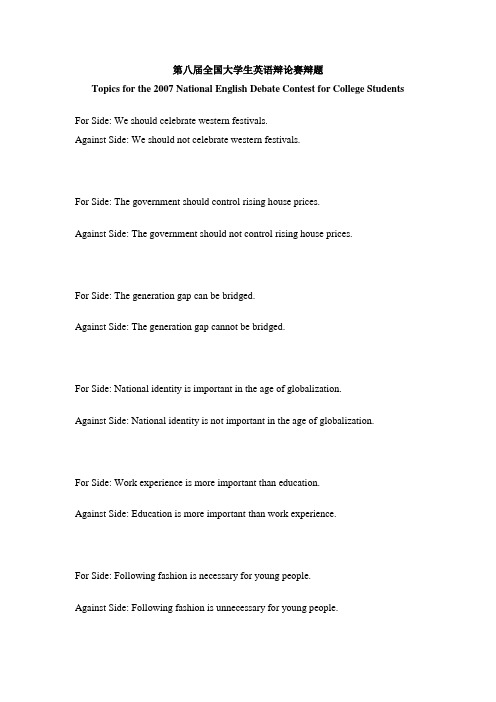
第八届全国大学生英语辩论赛辩题Topics for the 2007 National English Debate Contest for College StudentsFor Side: We should celebrate western festivals.Against Side: We should not celebrate western festivals.For Side: The government should control rising house prices.Against Side: The government should not control rising house prices.For Side: The generation gap can be bridged.Against Side: The generation gap cannot be bridged.For Side: National identity is important in the age of globalization.Against Side: National identity is not important in the age of globalization.For Side: Work experience is more important than education.Against Side: Education is more important than work experience.For Side: Following fashion is necessary for young people.Against Side: Following fashion is unnecessary for young people.For Side: Sending children to famous schools is essential.Against Side: Sending children to famous schools is not essential.For Side: People are happier living in cities than in the countryside. Against Side: People are happier living in the countryside than in cities.For Side: The car industry should be further developed in China. Against Side: The car industry should not be further developed in China.For Side: College students should be allowed to live off campus. Against Side: College students should not be allowed to live off campus.For Side: Men contribute more to society than women.Against Side: Women contribute more to society than men.For Side: The college entrance examinations should be abolished. Against Side: The college entrance examinations should not be abolished.For Side: It's good for college students to have a part-time job.Against Side: It's not good for college students to have a part-time job.For Side: It's better for a college graduate to find a job than to undertake postgraduate study.Against Side: It's better for a college graduate to undertake postgraduate study than to find a job.For Side: Students should choose their majors to meet their personal needs and interests.Against Side: Students should choose their majors to meet the needs of society.For Side: Learning oral English is more important than learning written English. Against Side: Learning written English is more important than learning oral English.For Side: E-books will eventually replace printed books.Against Side: E-books will never replace printed books.For Side: The Chinese men's football team is hopeful.Against Side: The Chinese men's football team is hopeless.For Side: The “golden week” holidays should be abolished.Against Side: The “golden week” holidays should not be abolished.For Side: Non-native English speaking teachers are better than native English speaking teachers.Against Side: Native English speaking teachers are better than non-native English speaking teachers.第十三届“外研社杯”全国英语辩论赛辩题(round 0-8,semifianls and grandfinal)2009-06-0415:19:310. Campus Lifea. China abolish English as a compulsory subject in postgraduate entrance examinations.b. China make military training compulsory for all college students.c. All major corporations operating in China should be required to offer student internships.1. Culturea. THW require study of the traditional style Chinese writing.b. TH opposes the private ownership of artifacts deemed to be national treasures.c. THBT Shanzhai culture is bad for China.2. Educationa. THW base teachers‘s pay on their students‘s performance.b. THW make community service compulsory for all college students.c. THBT Chinese compulsory education should be extended to 12 years3. Economya. TH supports a new international trading currency.b. THB that China should stop buying US debt.c. China should issue consumption vouchers to stimulate the economy.4. Global climate changea. Developed nations should accept global warming refugeesb. Those affected by global climate change should have the right to sue major carbon-emitting nations.c. China should cap its carbon emissions.5. East Asiaa. Immediate elections are in Thailand抯best interest.b. ASEAN should expel Myanmarc. Direct negotiations between the US and North Korea are preferable to the Six-Party Talks.6. Family & Populationa. THBT women should be allowed to sell their eggsb. TH would require the father抯consent for abortions.c. China should legalize marriage between homosexuals.7. Crime & Punishmenta. Criminals sentenced to life imprisonment without parole should be allowed to choose death instead.b. China should establish a national DNA database of all citizens for the purposes of criminal investigations.c. This house would make parents liable for their children抯crimes.8. Governing & Governmenta. THW make one-year military service a qualification for public servants.b. TH would require government officials to make full financial disclosure to the public.c. THW make all NPC representatives full-time, professional legislators. Octofinals: Medical servicea. China should ban hymen reconstruction surgeries.b. China should legalize physician-assisted suicide.c. The World Health Organization (WHO) should have the authority to quarantine in times of health crises.Quarterfinals: Judiciarya. China should apply capital punishment only to homicide cases.b. China should fully establish a jury-by-peers system.c. Judges should be elected.Semifinals: International IssuesSEMIFINAL #1a. The Shanghai Cooperation Organization should admit Iran as a full member.b. The United Nations should take control of Jerusalem.c. NATO should fully withdraw from Afghanistan before 2012.SEMIFINAL #2a. The USA should stop promoting democracy as part of their foreign policy.b. Pre-emptive strikes on Somalia to curb piracy are justified.c. This house supports Spain抯criminal prosecution of members of the Bush administration.FinalsThe PRC should ban the production, sale and consumption of all tobacco products.第十五届“外研社·中国银行杯”辩论赛辩题集锦Demo: The International Olympic Committee should remove any age requirements for children to compete in the Olympics.表演赛:国际奥林匹克委员会应取消青少年参与奥林匹克竞技的年龄限制。
英文辩论赛辩题(3篇)

第1篇Should Artificial Intelligence Be Regulated More Strictly?Format:This debate will follow the standard format, with two teams of three speakers each. The first team will present the motion that artificial intelligence (AI) should be regulated more strictly, while the second team will argue against the motion. Each speaker will have a specific role: the Opening Speaker will present the team's main arguments, the Rebuttal Speaker will address the opposition's points, and the Closing Speaker will summarize the team's key points and emphasize the overall argument.Team 1: In Favor of More Strict Regulation of AIOpening Speaker:Good evening, esteemed judges and audience members. We, the team in favor of more strict regulation of artificial intelligence, firmly believe that the exponential growth and increasing complexity of AI systems necessitate a more stringent regulatory framework. Our arguments are as follows:1. Preventing Harmful Consequences: AI has the potential to cause significant harm if not properly regulated. From autonomous weapons that could lead to unintended conflicts to AI-driven discrimination in hiring and lending practices, the risks are multifaceted. More strictregulation can help mitigate these risks by ensuring that AI systems are designed with safety and ethical considerations at the forefront.2. Protecting Privacy: AI systems often require vast amounts of personal data to function effectively. Without adequate regulation, there is a heightened risk of data breaches and misuse of personal information. Stricter regulations can enforce data protection measures, ensuring that individuals' privacy rights are respected and their data is not exploited.3. Promoting Transparency and Accountability: Many AI systems operate ina "black box" manner, making it difficult for humans to understand how decisions are made. This lack of transparency can lead to unfairness and accountability issues. More rigorous regulation can demand that AI systems be designed with explainability in mind, allowing for better oversight and trust in AI technologies.4. Fostering Fair Competition: Unregulated AI markets can lead to monopolies and anticompetitive practices. By implementing stricter regulations, we can ensure a level playing field for businesses, prevent the concentration of power, and promote innovation.5. Ensuring Societal Well-being: AI has the potential to disrupt entire industries and job markets. Without regulation, there is a risk of exacerbating economic inequality and social unrest. Stricter regulations can help manage these transitions, providing support for workers affected by AI and ensuring that the benefits of AI are distributed more equitably.Rebuttal Speaker:While the opponents have raised valid concerns, their arguments fail to acknowledge the benefits of AI and the potential of existing regulatory frameworks. Here are our rebuttals:1. Benefits of AI: The benefits of AI are undeniable. It has the potential to revolutionize healthcare, improve transportation safety, and enhance educational opportunities. Regulating AI too strictly could stifle innovation and prevent these benefits from being realized.2. Current Regulatory Frameworks: Many countries have already implemented AI regulations, and they are proving to be effective. For example, the EU's General Data Protection Regulation (GDPR) has significantly improved data protection. These existing frameworks can be strengthened and adapted to address new challenges, rather than imposing overly restrictive regulations.3. Balancing Innovation and Safety: It is crucial to find a balance between innovation and safety. The argument that more strict regulationwill stifle innovation is a red herring. By setting clear ethical guidelines and safety standards, we can ensure that AI development remains responsible and beneficial.Closing Speaker:In conclusion, the team in favor of more strict regulation of AI emphasizes the following points:1. The potential for AI to cause harm necessitates a more rigorous regulatory framework.2. Privacy concerns and the need for transparency and accountability demand stronger regulations.3. Fair competition and societal well-being can be better ensured through stricter AI regulation.We believe that by implementing a balanced and forward-thinking approach to AI regulation, we can harness the benefits of AI while minimizing its risks, ultimately leading to a more equitable and safer future.Team 2: Against More Strict Regulation of AIOpening Speaker:Good evening, esteemed judges and audience members. We, the team against more strict regulation of artificial intelligence, argue that excessive regulation could hinder the growth and potential of AI. Our arguments are as follows:1. Innovation and Economic Growth: AI is a key driver of innovation and economic growth. Overly strict regulations could stifle this progress, potentially leading to a loss of jobs and a decline in global competitiveness.2. Complexity of Regulation: The rapidly evolving nature of AI makes it challenging to develop effective and universally applicable regulations. By imposing strict regulations, we risk creating outdated rules that are not adaptable to the dynamic AI landscape.3. Self-regulation and Industry Standards: The AI industry has a vested interest in ensuring the responsible development and deployment of AI technologies. Many companies are already implementing their own ethical guidelines and standards, which can be more agile and effective than government regulations.4. International Collaboration: AI is a global issue that requires international cooperation to address. Overly strict regulations in one country could lead to a "race to the bottom" where countries compete to have the least restrictive rules, potentially undermining global efforts to manage AI responsibly.5. Flexibility and Adaptability: AI systems are highly adaptable, and strict regulations could limit their ability to evolve and respond to new challenges. By maintaining a more open and flexible approach, we can allow AI to adapt and innovate while addressing emerging issues as they arise.Rebuttal Speaker:The team in favor of regulation claims that it is necessary to protect against potential harms. However, their argument overlooks the following points:1. The risk of over-regulation: Excessive regulations could create a bureaucratic nightmare that hampers the development of AI, potentially leading to unintended consequences.2. The effectiveness of current regulations: Many of the concerns raised by the regulation proponents can be addressed through existing laws and industry best practices. For instance, data protection can be enforced through privacy laws, and safety standards can be maintained through industry standards.3. The potential for regulation to be misused: Regulations can be manipulated by vested interests, leading to regulations that favor certain groups or companies over others.Closing Speaker:In summary, the team against more strict regulation of AI asserts the following:1. AI is a driver of innovation and economic growth, and excessive regulation could stifle this progress.2. The complexity of AI makes it challenging to develop effective and universally applicable regulations.3. Self-regulation and industry standards can be more agile andeffective than government regulations.4. International collaboration is crucial, and overly strict regulations could undermine global efforts to manage AI responsibly.5. Flexibility and adaptability are key to addressing emerging issues in AI without hindering its development.We believe that a more balanced approach to AI regulation is necessary to harness the full potential of AI while managing its risks.第2篇Introduction:In recent years, the issue of gender-neutral dress codes in public schools has sparked intense debate. Proponents argue that such codes promote inclusivity and challenge traditional gender norms, while opponents claim that they infringe upon individual freedoms and may lead to confusion and discomfort. This debate will explore the arguments for and against the implementation of a gender-neutral dress code in public schools.Body:Argument for Gender-Neutral Dress Codes:1. Promotion of Inclusivity and Respect:A gender-neutral dress code in public schools can foster a more inclusive environment where students of all genders feel respected and accepted. It allows students to express their identity and genderexpression without fear of judgment or discrimination. This can contribute to a more harmonious school community where diversity is celebrated.2. Challenge to Traditional Gender Norms:Traditional gender norms often dictate specific clothing styles for boys and girls, which can limit individual expression and reinforce stereotypes. A gender-neutral dress code encourages students to break free from these constraints, promoting a more flexible and open-minded view of gender roles.3. Enhanced Focus on Academic Performance:By removing the focus on clothing and appearance, a gender-neutral dress code can help students concentrate on their studies. This can lead to a more conducive learning environment where academic performance is the primary concern, rather than external appearances.4. Legal and Ethical Obligations:Some argue that schools have a legal and ethical obligation toprotect students from discrimination based on gender identity. Implementing a gender-neutral dress code is one way to ensure that all students, regardless of their gender identity, are treated fairly and equally.Argument against Gender-Neutral Dress Codes:1. Infringement on Individual Freedoms:Opponents argue that a gender-neutral dress code infringes upon individual freedoms, particularly the right to self-expression. They believe that students should have the freedom to choose their own clothing based on personal preference and comfort, rather than being forced to conform to a school-imposed dress code.2. Potential for Confusion and Discomfort:A gender-neutral dress code may lead to confusion and discomfort among students and faculty who are not familiar with different genderexpressions. This could result in increased incidents of harassment and discrimination against students who do not conform to traditional gender norms.3. Parental Concerns:Many parents may have concerns about the implementation of a gender-neutral dress code, fearing that it may undermine their values or create an environment that is not conducive to their children's education. This could lead to parental pushback and resistance to the dress code's implementation.4. Impact on Discipline and Order:Some argue that a gender-neutral dress code may make it moredifficult for schools to maintain discipline and order. They believethat having a clear set of dress code rules helps to create a structured environment where students know what is expected of them.Conclusion:The debate over the implementation of a gender-neutral dress code in public schools is complex and multifaceted. While proponents argue that such a code promotes inclusivity, challenges traditional gender norms, and enhances academic performance, opponents raise concerns about individual freedoms, potential for confusion, parental concerns, and the impact on discipline and order. Ultimately, the decision to implement a gender-neutral dress code should be based on a careful consideration of these arguments, as well as the specific context and values of the school community.第3篇Introduction:In recent years, the issue of mandatory vaccination has sparked intense debate across the globe. Proponents argue that mandatory vaccination is crucial for public health and can prevent the spread of deadly diseases, while opponents claim that it infringes on individual rights and may have unforeseen consequences. This debate will explore both sides of theargument, ultimately determining whether governments should mandate vaccination for all citizens.Pro: Governments Should Mandate Vaccination for All Citizens1. Public Health BenefitsOne of the primary reasons for mandating vaccination is the significant public health benefits it offers. Vaccination has been proven to be one of the most effective methods for preventing the spread of infectious diseases. By mandating vaccination, governments can ensure a higherlevel of immunity within the population, thereby reducing the risk of outbreaks and protecting vulnerable individuals, such as the elderly and those with compromised immune systems.2. Economic AdvantagesMandatory vaccination can also have substantial economic benefits. By preventing outbreaks, governments can save billions of dollars in healthcare costs, including hospitalizations, treatment, and loss of productivity. Moreover, a healthy population is more likely tocontribute to economic growth and development.3. Ethical ResponsibilityGovernments have an ethical responsibility to protect their citizens from harm. By mandating vaccination, governments can ensure that therisk of infectious diseases is minimized, thereby promoting the overall well-being of their population.4. Herd ImmunityMandatory vaccination is essential for achieving herd immunity. Herd immunity occurs when a large percentage of a population is immune to a particular disease, which protects the entire community. By mandating vaccination, governments can help create a more robust immune barrier against infectious diseases.Con: Governments Should Not Mandate Vaccination for All Citizens1. Individual RightsOne of the most compelling arguments against mandatory vaccination is the infringement on individual rights. The right to make personal healthcare decisions is a fundamental aspect of freedom, and mandating vaccination could be seen as a violation of this right.2. Lack of ConsentMandatory vaccination means that individuals are being vaccinated against their will. This raises ethical concerns, as it could be seen as forced medical intervention. It is important to respect the autonomy of individuals and allow them to make informed decisions about their health.3. Potential Side EffectsWhile vaccines are generally safe and effective, they can still have potential side effects. Forcing individuals to receive vaccinations without their consent could lead to adverse reactions that could have serious consequences for their health.4. Diversity of OpinionsDifferent individuals have different opinions about vaccination. Mandating vaccination could lead to social divisions and could alienate groups who are skeptical of vaccines. It is important to respect the diversity of opinions and engage in open dialogue about the issue.Conclusion:After considering both sides of the argument, it is evident that the decision to mandate vaccination for all citizens is complex and multifaceted. While there are compelling public health and economic benefits to mandatory vaccination, the potential infringement on individual rights and the importance of informed consent cannot be overlooked. Ultimately, the decision should be based on a careful balance between these factors, and governments should consider alternative approaches, such as education, incentives, and mandatory vaccination for certain high-risk groups, rather than a blanket requirement for all citizens.In conclusion, the debate on whether governments should mandate vaccination for all citizens is a nuanced one, with valid arguments on both sides. While mandatory vaccination has its merits, it is crucial to consider the ethical implications and the importance of individualrights and informed consent. A balanced approach that addresses public health concerns while respecting individual autonomy is essential for an effective and just vaccination policy.。
英文辩论赛辩题大全

英文辩论赛辩题大全英文回答:1. Resolved: The benefits of genetically modified organisms outweigh the risks.Genetically modified organisms (GMOs) have sparked a fierce debate about their potential benefits and risks. Proponents of GMOs argue that they offer a number of advantages, including increased crop yields, resistance to pests and diseases, and enhanced nutritional value. They also point to the fact that GMOs have been extensively tested and found to be safe for human consumption.Opponents of GMOs, on the other hand, raise concerns about the potential environmental and health risks associated with their use. They argue that GMOs can cross-pollinate with wild plants, creating new and potentially harmful species. They also worry that GMOs could lead to the development of antibiotic-resistant bacteria.The debate over GMOs is complex and there is no easy answer. However, I believe that the potential benefits of GMOs outweigh the risks. GMOs have the potential to help us feed a growing global population and to reduce our reliance on pesticides and herbicides. They also have the potential to improve the nutritional value of our food.2. Resolved: The internet has had a negative impact on society.The internet has revolutionized the way we live our lives. It has made it easier to communicate with friends and family, to learn new things, and to access entertainment. However, some people argue that the internet has also had a negative impact on society.One of the main concerns about the internet is that it can be addictive. People can spend hours surfing the web, playing games, or watching videos. This can lead to problems with social isolation, sleep deprivation, and obesity.Another concern about the internet is that it can be a source of cyberbullying. Cyberbullying can have a devastating impact on victims, leading to depression, anxiety, and even suicide.Finally, some people worry that the internet is making us more narcissistic. Social media platforms like Facebook and Instagram encourage us to share our lives with others. This can lead to a constant need for attention and approval.I believe that the internet has had a mixed impact on society. While it has undoubtedly brought many benefits, it also has some potential drawbacks. It is important to be aware of these drawbacks and to use the internet in a healthy and balanced way.3. Resolved: The government should provide free healthcare to all citizens.Healthcare is a basic human right. Everyone deserves access to quality healthcare, regardless of their income oremployment status. The government has a responsibility to ensure that all citizens have access to the healthcare they need.There are many benefits to providing free healthcare to all citizens. First, it would improve the health of the population. People would be more likely to seek medical care if they did not have to worry about the cost. This would lead to earlier diagnosis and treatment of diseases, which would save lives and improve quality of life.Second, free healthcare would reduce poverty. Many people are forced to choose between paying for healthcare and paying for other necessities, such as food and housing. Free healthcare would eliminate this dilemma.Third, free healthcare would boost the economy. A healthy population is a productive population. People who are healthy are more likely to work and earn money. They are also more likely to be involved in their communities.I believe that the government should provide freehealthcare to all citizens. It is the right thing to do and it would have a positive impact on the health of the population, the economy, and society as a whole.中文回答:1. 同意,转基因生物的好处大于风险。
大学生英语辩论赛辩题(3篇)
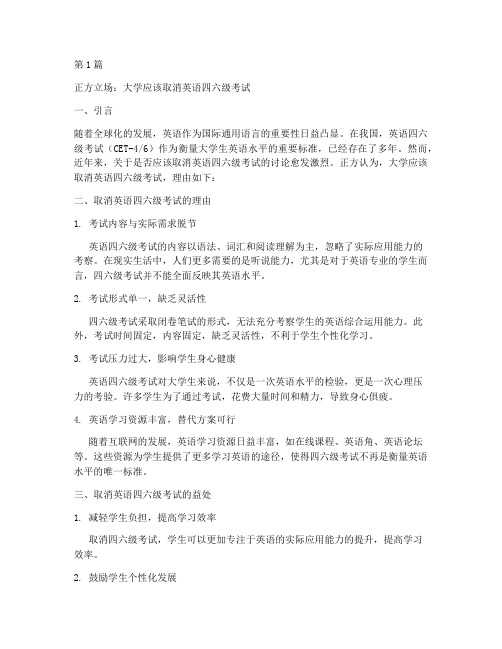
第1篇正方立场:大学应该取消英语四六级考试一、引言随着全球化的发展,英语作为国际通用语言的重要性日益凸显。
在我国,英语四六级考试(CET-4/6)作为衡量大学生英语水平的重要标准,已经存在了多年。
然而,近年来,关于是否应该取消英语四六级考试的讨论愈发激烈。
正方认为,大学应该取消英语四六级考试,理由如下:二、取消英语四六级考试的理由1. 考试内容与实际需求脱节英语四六级考试的内容以语法、词汇和阅读理解为主,忽略了实际应用能力的考察。
在现实生活中,人们更多需要的是听说能力,尤其是对于英语专业的学生而言,四六级考试并不能全面反映其英语水平。
2. 考试形式单一,缺乏灵活性四六级考试采取闭卷笔试的形式,无法充分考察学生的英语综合运用能力。
此外,考试时间固定,内容固定,缺乏灵活性,不利于学生个性化学习。
3. 考试压力过大,影响学生身心健康英语四六级考试对大学生来说,不仅是一次英语水平的检验,更是一次心理压力的考验。
许多学生为了通过考试,花费大量时间和精力,导致身心俱疲。
4. 英语学习资源丰富,替代方案可行随着互联网的发展,英语学习资源日益丰富,如在线课程、英语角、英语论坛等。
这些资源为学生提供了更多学习英语的途径,使得四六级考试不再是衡量英语水平的唯一标准。
三、取消英语四六级考试的益处1. 减轻学生负担,提高学习效率取消四六级考试,学生可以更加专注于英语的实际应用能力的提升,提高学习效率。
2. 鼓励学生个性化发展没有了四六级考试的束缚,学生可以根据自己的兴趣和需求选择英语学习方向,促进个性化发展。
3. 提高英语教学质量教师可以根据学生的实际需求调整教学内容和方法,提高英语教学质量。
4. 促进英语教育改革取消四六级考试,有助于推动英语教育改革,使英语教育更加贴近实际需求。
四、反方立场:大学不应该取消英语四六级考试五、反方观点1. 英语四六级考试是国际认可的英语水平证明英语四六级考试在全球范围内得到认可,对于学生的就业、出国留学等方面具有重要意义。
英文辩论赛辩题大全
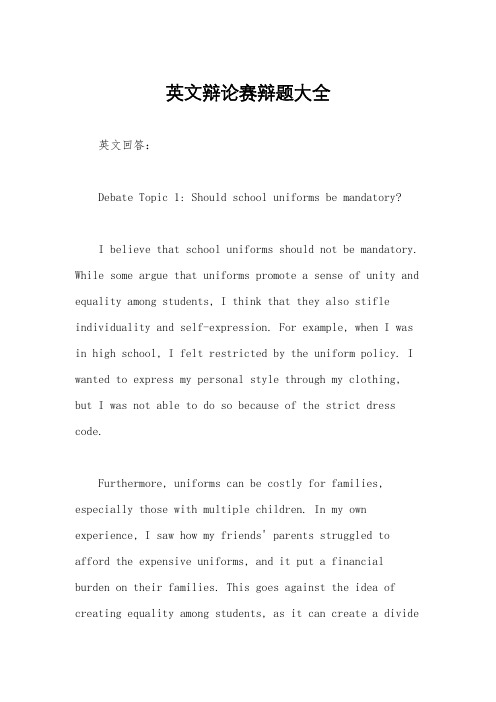
英文辩论赛辩题大全英文回答:Debate Topic 1: Should school uniforms be mandatory?I believe that school uniforms should not be mandatory. While some argue that uniforms promote a sense of unity and equality among students, I think that they also stifle individuality and self-expression. For example, when I was in high school, I felt restricted by the uniform policy. I wanted to express my personal style through my clothing, but I was not able to do so because of the strict dress code.Furthermore, uniforms can be costly for families, especially those with multiple children. In my own experience, I saw how my friends' parents struggled to afford the expensive uniforms, and it put a financial burden on their families. This goes against the idea of creating equality among students, as it can create a dividebetween those who can afford the uniforms and those who cannot.中文回答:辩题1,学校是否应该强制校服?我认为学校不应该强制统一校服。
英文辩论赛辩题
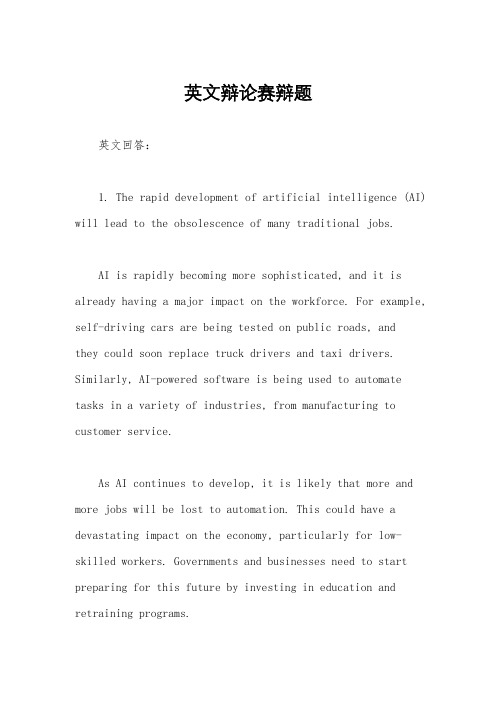
英文辩论赛辩题英文回答:1. The rapid development of artificial intelligence (AI) will lead to the obsolescence of many traditional jobs.AI is rapidly becoming more sophisticated, and it is already having a major impact on the workforce. For example, self-driving cars are being tested on public roads, andthey could soon replace truck drivers and taxi drivers. Similarly, AI-powered software is being used to automate tasks in a variety of industries, from manufacturing to customer service.As AI continues to develop, it is likely that more and more jobs will be lost to automation. This could have a devastating impact on the economy, particularly for low-skilled workers. Governments and businesses need to start preparing for this future by investing in education and retraining programs.2. Social media has a negative impact on mental health.Social media can be a great way to stay connected with friends and family, but it can also have a negative impact on mental health. For example, studies have shown that people who spend a lot of time on social media are more likely to experience depression, anxiety, and loneliness.One reason for this is that social media can create a sense of comparison. When we see our friends and family posting about their perfect lives, it can make us feel like we are not good enough. Additionally, social media can be a source of cyberbullying, which can also have a negative impact on mental health.It is important to be aware of the potential risks of social media use, and to take steps to protect your mental health. For example, you can limit the amount of time you spend on social media, and you can avoid following people who make you feel bad about yourself.3. The death penalty is an effective deterrent to crime.The death penalty is a controversial issue, and thereis no easy answer to the question of whether or not it isan effective deterrent to crime. However, there is some evidence to suggest that the death penalty may be a deterrent, at least for certain types of crimes.For example, a study by the National Research Council found that the death penalty may have a deterrent effect on murder. The study found that states with the death penalty have lower murder rates than states without the death penalty.However, it is important to note that correlation does not equal causation. Just because states with the death penalty have lower murder rates does not necessarily mean that the death penalty is the cause of the lower murder rates. There could be other factors that contribute to the lower murder rates, such as stricter gun control laws or a stronger economy.Ultimately, the question of whether or not the death penalty is an effective deterrent to crime is a complex one that cannot be answered definitively.中文回答:1. 人工智能(AI)的快速发展将导致许多传统工作过时。
CUDC英语辩论赛历年辩题(3篇)

第1篇CUDC(中国大学生英语辩论赛)自2003年创办以来,已成功举办多届。
作为我国大学生英语辩论的盛会,CUDC吸引了众多高校的优秀辩手参与,为大学生提供了一个展示英语能力、锻炼思维、提升口才的舞台。
以下是CUDC历年部分辩题回顾:一、2003年CUDC英语辩论赛辩题1. 舍近求远,留学更有利于个人发展。
2. 在线教育优于传统教育。
3. 科技发展使得人与人之间的距离越来越远。
4. 互联网时代,隐私权是否应该受到限制?二、2004年CUDC英语辩论赛辩题1. 人类应该干预自然选择。
2. 人类应该限制生育。
3. 媒体对青少年价值观的影响。
4. 全球化进程中,文化多样性是否会消失?三、2005年CUDC英语辩论赛辩题1. 社会主义优于资本主义。
2. 互联网对人际交往的影响。
3. 青少年过度依赖手机有害。
4. 应否取消法定节假日?四、2006年CUDC英语辩论赛辩题1. 政府应该对互联网进行监管。
2. 青少年应该接受军事训练。
3. 应否将计划生育政策延长至2050年?4. 网络成瘾是否应该被视为一种疾病?五、2007年CUDC英语辩论赛辩题1. 人工智能将取代人类工作。
2. 应否对动物进行克隆?3. 全球变暖对人类生存的影响。
4. 应否取消死刑?六、2008年CUDC英语辩论赛辩题1. 人类应该追求物质生活还是精神生活?2. 应否对网络色情进行打击?3. 青少年过度沉迷网络游戏是否应该受到法律制裁?4. 应否实行义务教育?七、2009年CUDC英语辩论赛辩题1. 应否对网络言论进行审查?2. 青少年吸烟现象是否应该受到重视?3. 应否对流浪动物进行收容和救助?4. 应否将教育产业化?八、2010年CUDC英语辩论赛辩题1. 应否将社交媒体作为主要的交流工具?2. 应否对青少年进行性教育?3. 应否对网络暴力进行法律制裁?4. 应否对食品安全问题进行严格监管?九、2011年CUDC英语辩论赛辩题1. 应否对网络虚拟货币进行监管?2. 应否对青少年进行网络素养教育?3. 应否对网络游戏进行分级?4. 应否对个人信息进行保护?十、2012年CUDC英语辩论赛辩题1. 应否对互联网进行审查?2. 应否对青少年进行网络安全教育?3. 应否对网络言论进行实名制?4. 应否对食品安全问题进行严格监管?十一、2013年CUDC英语辩论赛辩题1. 应否对互联网进行审查?2. 应否对青少年进行网络安全教育?3. 应否对网络言论进行实名制?4. 应否对食品安全问题进行严格监管?通过以上回顾,我们可以看到CUDC英语辩论赛的辩题涵盖了政治、经济、文化、社会等多个领域,旨在引导大学生关注社会热点问题,提高他们的英语表达能力、逻辑思维能力和团队协作能力。
大学英语辩论赛的辩题(3篇)

第1篇正方立场:大学应强制实施学分制反方立场:大学不应强制实施学分制---正方立论稿尊敬的裁判、各位评委、各位观众:今天,我们正方团队坚定地认为,大学应强制实施学分制。
以下是我们的主要论点:一、学分制有助于提高教育质量1. 个性化培养:学分制允许学生根据自己的兴趣和职业规划选择课程,从而实现个性化培养。
这种灵活性有助于学生发展多元化的知识结构和技能,为未来的职业生涯打下坚实基础。
2. 课程质量提升:为了吸引学生修读,教师需要不断提高课程质量。
学分制促使教师关注课程内容的深度和广度,激发教学创新,从而提高整体教育质量。
3. 教学质量评估:学分制为教学质量评估提供了明确的指标。
学生和教师可以根据学分完成情况,对课程和教师进行客观评价,促进教育质量的持续改进。
二、学分制有利于学生全面发展1. 综合素质培养:学分制鼓励学生修读跨学科课程,拓宽知识面,培养创新思维和解决问题的能力。
这种综合素质的培养有助于学生成为适应社会需求的高素质人才。
2. 时间管理能力:学分制要求学生合理安排学习时间,培养良好的时间管理能力。
这种能力对于学生未来的职业生涯具有重要意义。
3. 自主学习能力:学分制促使学生主动学习,提高自主学习能力。
这种能力有助于学生在未来不断学习、适应社会发展的需要。
三、学分制有助于推动教育公平1. 资源优化配置:学分制有助于优化教育资源分配,使优质课程资源得到充分利用。
这有助于缩小不同学校、不同专业之间的教育资源差距。
2. 机会均等:学分制为学生提供了更多选择的机会,使来自不同背景的学生都能在大学获得公平的教育机会。
3. 选拔公平:学分制为选拔优秀学生提供了客观标准,避免了因地域、家庭背景等因素导致的选拔不公平现象。
综上所述,我们认为大学应强制实施学分制。
这一制度有助于提高教育质量、促进学生全面发展,并推动教育公平。
谢谢第2篇Introduction:The purpose of higher education has been a topic of debate for decades. With the ever-evolving job market and the increasing importance of practical skills, some argue that universities should prioritize practical skills training. Others believe that a strong foundation in theoretical knowledge is crucial for long-term success. This debate aims to explore whether universities should focus more on practical skills training or on theoretical knowledge education.Background:In recent years, there has been a growing trend towards vocational education and training, which emphasizes the acquisition of practical skills that are directly applicable to the workplace. On the other hand, traditional academic education focuses on the development of critical thinking, analytical skills, and a deep understanding of various subjects. Both approaches have their merits, but the question remains: which should universities prioritize?Proponents of Practical Skills Training:1. Market Relevance:Supporters of practical skills training argue that the current job market demands professionals who can hit the ground running. By focusing on practical skills, universities can better prepare students for the workforce, reducing the time and resources needed for on-the-job training.2. Student Employment:A strong emphasis on practical skills can lead to higher employment rates for graduates. Employers often seek candidates who have hands-on experience and can contribute immediately to their organizations, making practical skills a valuable asset in the job market.3. Adaptability to Technological Changes:The rapid pace of technological advancement necessitates a workforcethat can quickly adapt to new tools and methodologies. Practical skills training equips students with the agility to learn and adapt, ensuring they remain competitive in a dynamic job market.4. Economic Benefits:By producing graduates who are ready to enter the workforce,universities can contribute to economic growth and development. Countries with a skilled workforce are more likely to attract investment and enjoy higher levels of economic prosperity.Contra: The Importance of Theoretical Knowledge Education:1. Foundation for Innovation:Advocates of theoretical knowledge education argue that a strong foundation in various disciplines is essential for fostering innovation and creativity. Theoretical knowledge allows individuals to think critically and develop new ideas, which are the backbone of technological and social progress.2. Transferable Skills:The skills acquired through theoretical education, such as problem-solving, critical thinking, and communication, are transferable to various fields and situations. These skills are invaluable in a diverse and ever-changing workforce.3. Intellectual Growth:A well-rounded education that includes theoretical knowledge promotes intellectual growth and a deeper understanding of the world. This intellectual curiosity can lead to lifelong learning and personal fulfillment.4. Long-term Career Success:While practical skills are important, the ability to apply theoretical knowledge to real-world problems is often what separates successful professionals from their peers. Theoretical education can provide the breadth and depth necessary for long-term career success.Conclusion:The debate between practical skills training and theoretical knowledge education is not an either/or situation but rather a question of balance. Universities should strive to provide a well-rounded education that incorporates both practical skills and theoretical knowledge. While practical skills are essential for immediate job readiness and adaptability, theoretical knowledge fosters innovation, critical thinking, and long-term career success. By striking a balance betweenthe two, universities can prepare students for a dynamic and ever-changing world.Further Discussion Points:- The role of industry partnerships in bridging the gap betweenpractical and theoretical education.- The impact of online and hybrid learning models on the practicalityand theory of education.- The importance of interdisciplinary studies in fostering bothpractical and theoretical skills.- The potential challenges and benefits of implementing a dual focus on practical and theoretical education.- The responsibility of universities to prepare students for both immediate employment and future career development.This debate aims to explore these points and provide a comprehensive analysis of the merits and challenges associated with focusing more on practical skills training or on theoretical knowledge education in universities.第3篇正方立场:Online Education Should Replace Traditional Classroom Teaching反方立场:Traditional Classroom Teaching Should Not Be Replaced by Online Education---Title: The Future of Education: Should Online Education Replace Traditional Classroom Teaching?Introduction:In the rapidly evolving digital age, the landscape of education is undergoing a significant transformation. With the advent of advanced technology and the internet, online education has emerged as a viable alternative to traditional classroom teaching. This debate seeks to explore whether online education should completely replace traditional classroom teaching, considering the advantages and disadvantages of both methods.Body:I. Advantages of Online Education1. Accessibility and Flexibility:- Online education allows students to access learning materials from anywhere in the world, breaking geographical barriers.- Students can study at their own pace, fitting their learning schedule around other commitments, such as work or family.2. Cost-Effectiveness:- Online courses often cost less than traditional education, reducing the financial burden on students and institutions.- There is no need for physical infrastructure, such as classrooms or libraries, further cutting costs.3. Customization and Personalization:- Online platforms can offer personalized learning experiences, adapting to individual student needs and learning styles.- Advanced technologies, such as AI and machine learning, can provide tailored feedback and support.4. Increased Engagement:- Interactive tools, such as forums, video conferencing, and gamification, can enhance student engagement and motivation.- Students can collaborate with peers from diverse backgrounds, fostering a global learning community.II. Disadvantages of Online Education1. Lack of Social Interaction:- Traditional classrooms offer a unique social environment where students can develop relationships, build networks, and learn teamwork skills.- Online education may limit the development of interpersonal skills and social intelligence.2. Technical Challenges:- Students may face technical difficulties, such as poor internet connectivity or lack of access to necessary technology.- Online learning requires self-discipline and time management skills, which some students may lack.3. Quality Control:- Ensuring the quality of online education can be challenging, as there is no face-to-face interaction between instructors and students.- Some students may struggle with self-motivation and may not receive the same level of guidance as in a traditional classroom setting.III. The Role of Traditional Classroom Teaching1. Hands-On Learning:- Certain subjects, such as science experiments or art projects, require physical presence and hands-on learning that online education may not provide.2. Teacher-Student Interaction:- In a traditional classroom, teachers can observe students'reactions and provide immediate feedback, which can be crucial for learning.- The personal touch of a teacher can inspire and motivate studentsto excel.3. Cultural and Social Impact:- Traditional classrooms offer a space for cultural exchange andsocial development, fostering a sense of community and identity.Conclusion:After weighing the advantages and disadvantages of both online education and traditional classroom teaching, the positive aspects of online education, such as accessibility, flexibility, and customization,suggest that it should eventually replace traditional classroom teaching. However, it is crucial to recognize that online education cannot fully replicate the social and cultural benefits of traditional classrooms. Therefore, a hybrid model that combines the best of both worlds may be the most effective approach to education in the future.Points to Consider for the Debate:- The potential for online education to reach underserved populations and bridge the education gap.- The importance of ensuring quality and equity in online education for all students.- The role of technology in supporting and enhancing both online and traditional education.- The need for continuous professional development for educators in the context of online education.- The long-term impact of online education on the future of the workforce and the economy.---This debate aims to stimulate a thoughtful discussion on the future of education and the role of technology in shaping our learning environments. Both sides present compelling arguments, and the outcome of the debate will depend on the evaluation of the strengths and weaknesses of each educational approach.。
- 1、下载文档前请自行甄别文档内容的完整性,平台不提供额外的编辑、内容补充、找答案等附加服务。
- 2、"仅部分预览"的文档,不可在线预览部分如存在完整性等问题,可反馈申请退款(可完整预览的文档不适用该条件!)。
- 3、如文档侵犯您的权益,请联系客服反馈,我们会尽快为您处理(人工客服工作时间:9:00-18:30)。
第八届全国大学生英语辩论赛辩题Topics for the 2007 National English Debate Contest for College StudentsFor Side: We should celebrate western festivals.Against Side: We should not celebrate western festivals.For Side: The government should control rising house prices.Against Side: The government should not control rising house prices.For Side: The generation gap can be bridged.Against Side: The generation gap cannot be bridged.For Side: National identity is important in the age of globalization.Against Side: National identity is not important in the age of globalization.For Side: Work experience is more important than education.Against Side: Education is more important than work experience.For Side: Following fashion is necessary for young people.Against Side: Following fashion is unnecessary for young people.For Side: Sending children to famous schools is essential.Against Side: Sending children to famous schools is not essential.For Side: People are happier living in cities than in the countryside. Against Side: People are happier living in the countryside than in cities.For Side: The car industry should be further developed in China. Against Side: The car industry should not be further developed in China.For Side: College students should be allowed to live off campus. Against Side: College students should not be allowed to live off campus.For Side: Men contribute more to society than women.Against Side: Women contribute more to society than men.For Side: The college entrance examinations should be abolished. Against Side: The college entrance examinations should not be abolished.For Side: It's good for college students to have a part-time job.Against Side: It's not good for college students to have a part-time job.For Side: It's better for a college graduate to find a job than to undertake postgraduate study.Against Side: It's better for a college graduate to undertake postgraduate study than to find a job.For Side: Students should choose their majors to meet their personal needs and interests.Against Side: Students should choose their majors to meet the needs of society.For Side: Learning oral English is more important than learning written English. Against Side: Learning written English is more important than learning oral English.For Side: E-books will eventually replace printed books.Against Side: E-books will never replace printed books.For Side: The Chinese men's football team is hopeful.Against Side: The Chinese men's football team is hopeless.For Side: The “golden week” holidays should be abolished.Against Side: The “golden week” holidays should not be abolished.For Side: Non-native English speaking teachers are better than native English speaking teachers.Against Side: Native English speaking teachers are better than non-native English speaking teachers.第十三届“外研社杯”全国英语辩论赛辩题(round 0-8,semifianls and grandfinal)2009-06-0415:19:310. Campus Lifea. China abolish English as a compulsory subject in postgraduate entrance examinations.b. China make military training compulsory for all college students.c. All major corporations operating in China should be required to offer student internships.1. Culturea. THW require study of the traditional style Chinese writing.b. TH opposes the private ownership of artifacts deemed to be national treasures.c. THBT Shanzhai culture is bad for China.2. Educationa. THW base teachers‘s pay on their students‘s performance.b. THW make community service compulsory for all college students.c. THBT Chinese compulsory education should be extended to 12 years3. Economya. TH supports a new international trading currency.b. THB that China should stop buying US debt.c. China should issue consumption vouchers to stimulate the economy.4. Global climate changea. Developed nations should accept global warming refugeesb. Those affected by global climate change should have the right to sue major carbon-emitting nations.c. China should cap its carbon emissions.5. East Asiaa. Immediate elections are in Thailand抯best interest.b. ASEAN should expel Myanmarc. Direct negotiations between the US and North Korea are preferable to the Six-Party Talks.6. Family & Populationa. THBT women should be allowed to sell their eggsb. TH would require the father抯consent for abortions.c. China should legalize marriage between homosexuals.7. Crime & Punishmenta. Criminals sentenced to life imprisonment without parole should be allowed to choose death instead.b. China should establish a national DNA database of all citizens for the purposes of criminal investigations.c. This house would make parents liable for their children抯crimes.8. Governing & Governmenta. THW make one-year military service a qualification for public servants.b. TH would require government officials to make full financial disclosure to the public.c. THW make all NPC representatives full-time, professional legislators. Octofinals: Medical servicea. China should ban hymen reconstruction surgeries.b. China should legalize physician-assisted suicide.c. The World Health Organization (WHO) should have the authority to quarantine in times of health crises.Quarterfinals: Judiciarya. China should apply capital punishment only to homicide cases.b. China should fully establish a jury-by-peers system.c. Judges should be elected.Semifinals: International IssuesSEMIFINAL #1a. The Shanghai Cooperation Organization should admit Iran as a full member.b. The United Nations should take control of Jerusalem.c. NATO should fully withdraw from Afghanistan before 2012.SEMIFINAL #2a. The USA should stop promoting democracy as part of their foreign policy.b. Pre-emptive strikes on Somalia to curb piracy are justified.c. This house supports Spain抯criminal prosecution of members of the Bush administration.FinalsThe PRC should ban the production, sale and consumption of all tobacco products.第十五届“外研社·中国银行杯”辩论赛辩题集锦Demo: The International Olympic Committee should remove any age requirements for children to compete in the Olympics.表演赛:国际奥林匹克委员会应取消青少年参与奥林匹克竞技的年龄限制。
